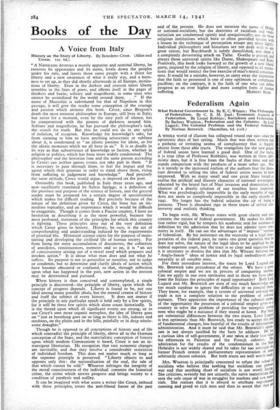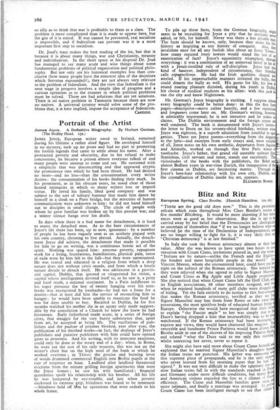Federalism Again
What Federal Government Is. By K. C. Wheare ; The Philosophy of Federalism. By C. E. M. Joad ; Economic Aspects of Federation. By Lionel Robbins; Socialism and Federation. By Barbara Wootton; Federation and the Colonies. By Lord Lugard; The Colonial Problem and the Federal Solution. By Norman Bentwich. (Macmillan, 6d. each.) A WHOLE world of illusion has collapsed round our ears since the optimistic days of last spring. Much that was then written had a pathetic or irritating aroma of complacency that is happily absent from these able tracts. The evangelists for the new gospel of federal union haim learned a good deal. One of the tracts, it is true (that of Professor Robbins), was written in those opti- mistic days, but it is free from the faults of that time and well stands comparison with the products of a more sober age. Nor is it merely in the increased realism of the authors that the litera- ture devoted to selling the idea of federal union seems to have improved. With so many small and one great State forced to realise the artificial and illusory character of national sovereignty, educated by the brutal fact of Nazi invasion and domination, the chances of a drastic solution of our troubles have improved. What was psychologically impossible in the early months of 194o• does not seem so completely impossible in the early months of 1941. No longer .has the federal solution the- air of being a panacea. There is abundant sign in these tracts of critical con- troversy and realistic thinking.
To begin with, Mr. Wheare states with great clarity and con- ciseness the nature of federal government. He makes his defini- tion rather rigid, but he tempers his academic zeal for neatness of definition by the admission that he does not admire mere sym- metry in itself. He can see the advantages of " impure " versions of federalism. By his insistence on the necessity of a legal inter- pretation of the federal pact, he raises one great question that be does not solve, the nature of the legal ideas to be applied by the federal supreme court, but the tract is so clear and sagacious that it is necessary to dismiss the idea that Mr. Wheare believes that " Anglo-Saxon " ideas of justice and its legal embodiment come naturally to all sensible men. For their immediate interest, the tracts by Lord Lugard and Mr. Bentwich take precedence of the others. We have a great colonial empire and we are in process of conquering another. Can we apply in our own territories and in those we have taken from the Italians the principles of equal opportunity? Both Lord Lugard and Mr. Bentwich are men of too much knowledge and too much candour to ignore the difficulties or to conceal them. They know, for example, that a system of universal colonial free trade is not a complete solution to the problem of colonial jealousy. They appreciate the importance of the colonial carat, of the opportunity the possession of a colonial empire gives to l country to solve the problem of providing for energetic young men who might be a nuisance if they stayed at home. But there are substantial differences between the two tracts. Lord Lugani is less optimistic than Mr. Bentwich, less ready to accept the Wm of fundamental changes, less hopeful of the results of international administration. And it must be said that Mr. Bentwich's opts ism is not always justified by the facts he adduces. He has a curious idea of self-government, if one takes at their face value his references to Palestine and the French colonies. Hs admiration for the results of the condominium in the Net/ Hebrides is not widely shared and hi takes far too seriously the former French system of parliamentary representation of °Ise, arbitrarily chosen colonies. But both ,tracts are well worth sow' Mrs. Wootton is principally concerned to refute the school d socialists who believe. that nothing but socialism can Prevrrst war and that anything short of socialism is not worth haling._ She criticises, severely but not unjustly, the =lie materialism tO sees the sole cause of war in struggles for markets and raw mate. rials. She realises that it is absurd to attribute suporhun! cunning and greed to rich men and then to assert that they a`` so silly as to think that war is profitable to them as a class. The problem is more complicated than it is made to appear here, but the gist of it is stated. If war cannot be prevented, real socialism is impossible, and if federalism can prevent war it is a most important first step to socialism.
Dr. Joad's tract makes the best reading of the lot, but that is because it is about many things, war and Christianity, tyranny and individualism. In the short space at his disposal Dr. Joad has managed to say many acute and wise things about some fundamental problems of political organisation and political philo- sophy. But not only are his historical examples less than con- clusive (how many people have the remotest idea of the doctrines which Servetus expounded?), they are not always very relevant to the problem of federalism. And the view that federalism is the next stage in progress involves a simple idea of progress and a curious optimism as to the manner in which political problems must be solved. There are bad solutions that are yet solutions. There is no native problem in Tasmania because there are now no natives. A universal tyranny would solve some of the pro- blems that, it is here implied, impose the acceptance of federalism.
CANDIDE.































 Previous page
Previous page